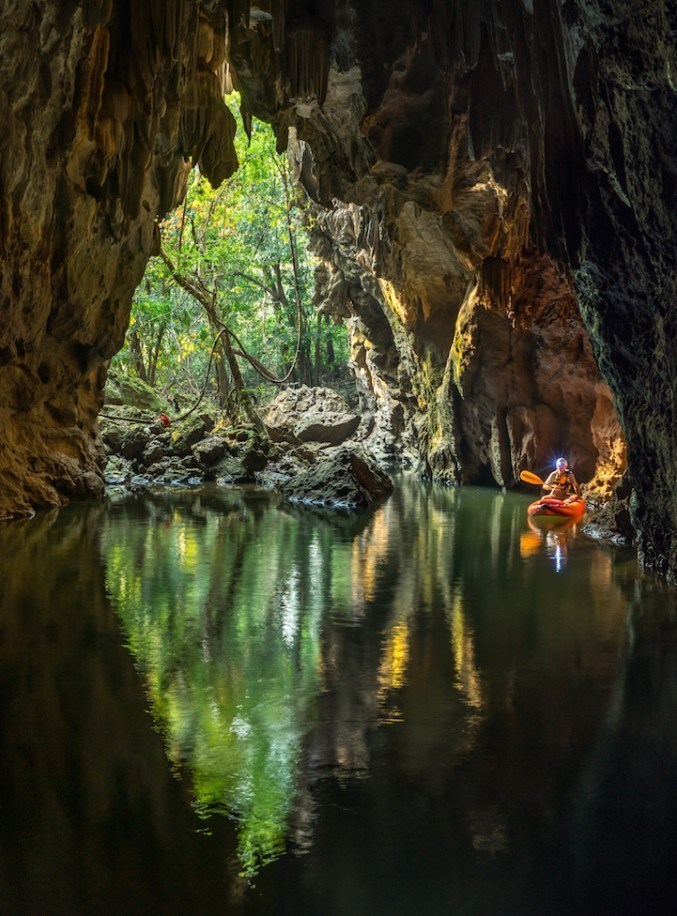AMAZING OPENINGS INTO SUBTERRANEAN WORLD

CAVE LODGE - JOHN SPIES
Some say it is the most awesome opening on Earth! Hang Son Doong, in Vietnam, is the world’s largest cave and it is filled with unimaginable beauty.
Known as “Mountain River Cave,” it is one of 300 caves in the Phong Nha-Ke Bang National Park cave system, a UNESCO World Heritage Site, but it is without a doubt the most remarkable.
Australian caver and photographer John Spies knows the cave well -- he’s lived inside it for a week at a time, capturing its many wonders. He and his partner run a guesthouse called Cave Lodge, located right near the the caves, They also offer guided tours.
Spies has been exploring caves for more than 30 years. He knows how to find them -- discovering many never before seen by humans. He knows how to navigate around their incredible formations and wind through their convoluted passages. He knows how to photograph their drama.

Son Doong’s ceilings soar to more than 200 metres high in places. The entrance is quite small. You must descend 80m down a steep wall, using harnesses and ropes to enter. Cool temperatures below meet warm wafts from above and create underground clouds, especially near the two karst windows -- it’s magical.

The interior of the caves are unlike anything you’ve ever seen, with alien landscapes and unique ecosystems. You must then scramble over massive boulders and navigate around monumental blocks of limestone.

Inside, you’ll find spectacular subterranean rainforests, 350-million-year old coral fossils, towering karst peaks, met by killer stalactites, jungle rivers, trippy gour pools, and an underground lake.
Spies has been as deep as 5 miles in.

While Son Doong was formed over 400 million years ago, and it’s so big that a Boeing 747 could fly through its biggest cavern, the cave was only just discovered in 1991 by a local man who was foraging in the forest. British Cave Research Association (BCRA) led exploratory missions a few years later. It first opened to for very limited public visits in 2013.

Spies has documented over 80 caverns in Laos, Thailand, and Vietnam, a few of which he lays claim to discovering. He’s documented new species of eyeless cave fish and a new genus of cave fish that has adapted its fins to climb cave waterfalls.
Some of these caves were carved out of the limestone bedrock by active streams. Others are dry caverns.

Spies also became fascinated with the way the caves preserved artifacts left by past cultures. He’s found the remains of prehistoric teak-wood log coffins in over 80 caves in Pang Mapha district of Mae Hong Son Province. Bones, pottery, tools and decorative items, strewn about are between 1500 and 2200 years old. Ancient rock art has survived in a few sites and stone tools up to 30,00 years old are common in cave entrances and overhangs.

Tham Xe Bang Fai, a cave in Laos, is one of Spies’ favorite places. It contains the world's largest gour pool. Bring your kayak or your bamboo raft!
Spies can also lead you to an amazing bird show, where 300,000 swifts return to nest in the cave each evening.
Whether you kayak, trek, camp, or climb, you can even discover an unexplored cave yourself.

Read more about Opening Beauty all this week on BeautifulNow. And check out more beautiful things happening now in BN Wellness, Impact, Nature/Science, Food, Arts/Design, and Travel, Daily Fix posts.

Want more stories like this? Sign up for our weekly BN Newsletter, Like us on Facebook. Follow us on Twitter, Instagram, Pinterest. Join our BeautifulNow Community and connect with the most beautiful things happening in the world right now!
Do you have amazing photos? Enter them in this week’s BN Photo Competition.


